Be the change
Your latest update from ActionAid UK
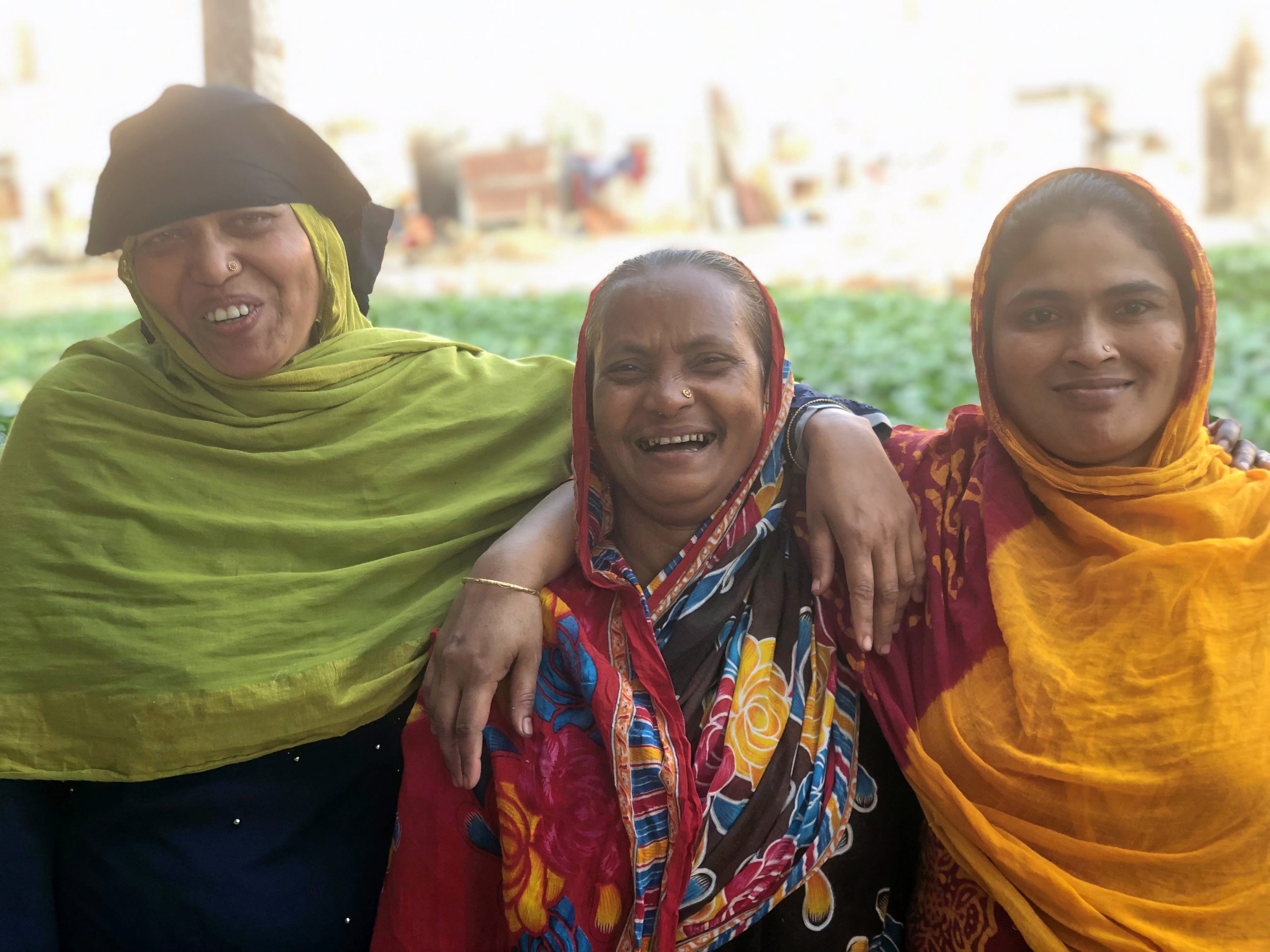
Women and girls are working tirelessly to claim and defend their rights, like Diane from Rwanda, who mobilised women in her community to form a farming cooperative, and Suwadou from The Gambia, who is working to end period poverty.
Read below how they, and other inspiring women and girls, are leading change around the world.
It's important to remember that men and boys also have a vital role to play. Below you'll also hear from 14-year-old Ernest from Ghana, who now recognises the importance of helping with household chores.
Change would not happen without the action and determination of communities around the world, supported by ActionAid, in partnership with you. Thank you.
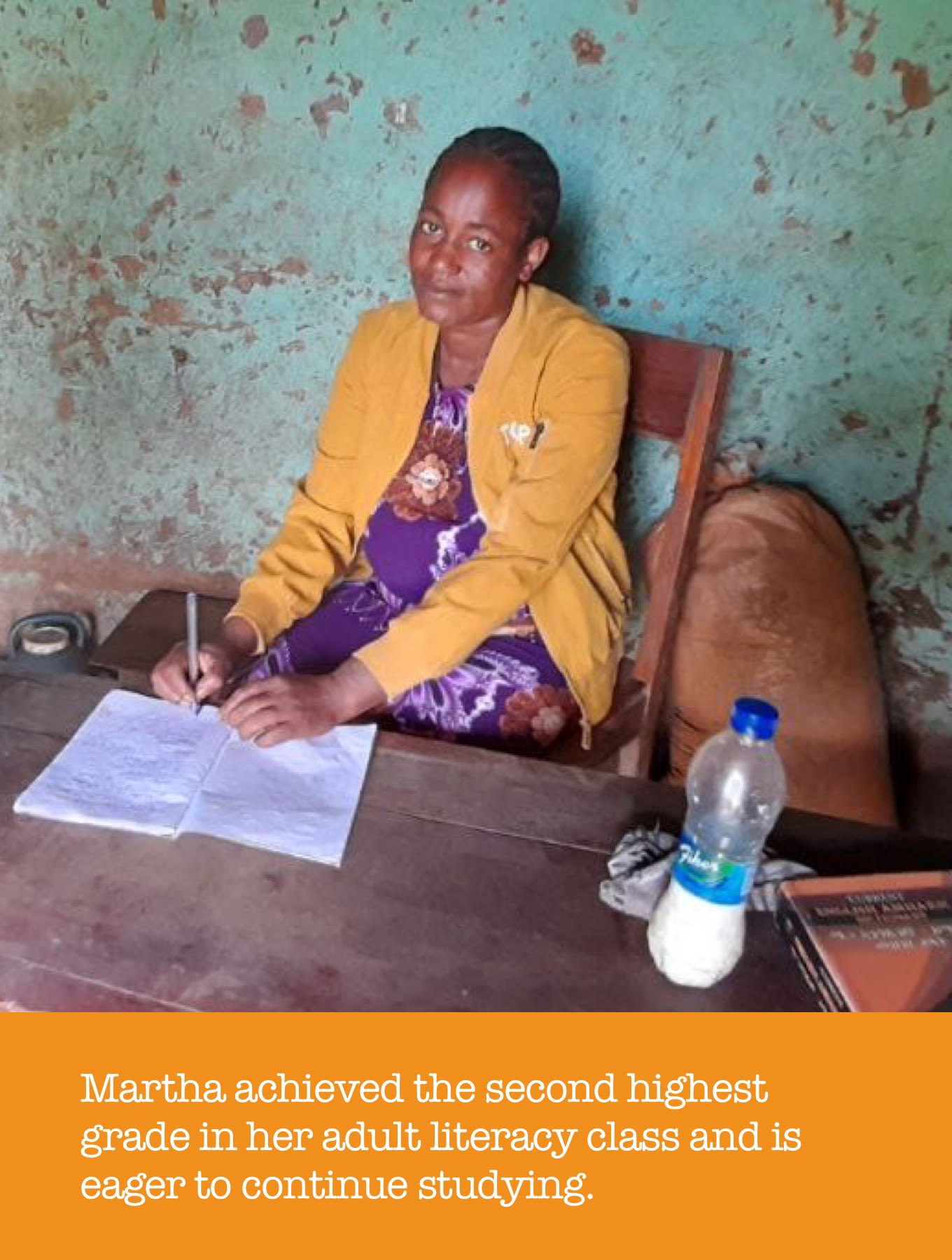
In Ethiopia
By learning to read and write, women are leading more independent lives

In Semen Bench, Ethiopia, girls are often denied an education. Many enter adulthood unable to read or write. Women like Martha are determined to change this.
By joining adult literacy courses, which are supported by ActionAid, women like her are breaking down barriers to education and independence.
"My name is Martha, and I am 32 years old," she told us. "As a child, I did not have the opportunity to go to school, so it is only recently that I have learnt to read and write.
I became the first woman to attend the adult literacy programme in my community because I saw it as the best chance to learn what I had missed in my childhood.
"After six months of learning, I completed the course with a good grade. I scored 96/100 points, the second-highest of the 50 students in my class.
"Being unable to read and write hindered me greatly. I had no role in anything that required literacy skills. It was my husband that managed our finances, and I had no control over them. I could not start a business and support my family or participate in social roles that required literacy skills.
"I have also been part of a programme, run by ActionAid in my community, that focuses on women's social and economic empowerment.
"I received training in business and financial management and now run my own business. I sell dairy products as I have three cows and I also grow and sell cabbages.
"This all contributes to living a healthy life with my family and being able to send my children to school. My life has transformed for the better."
In Rwanda
Women are supporting other women, and setting up farming cooperatives
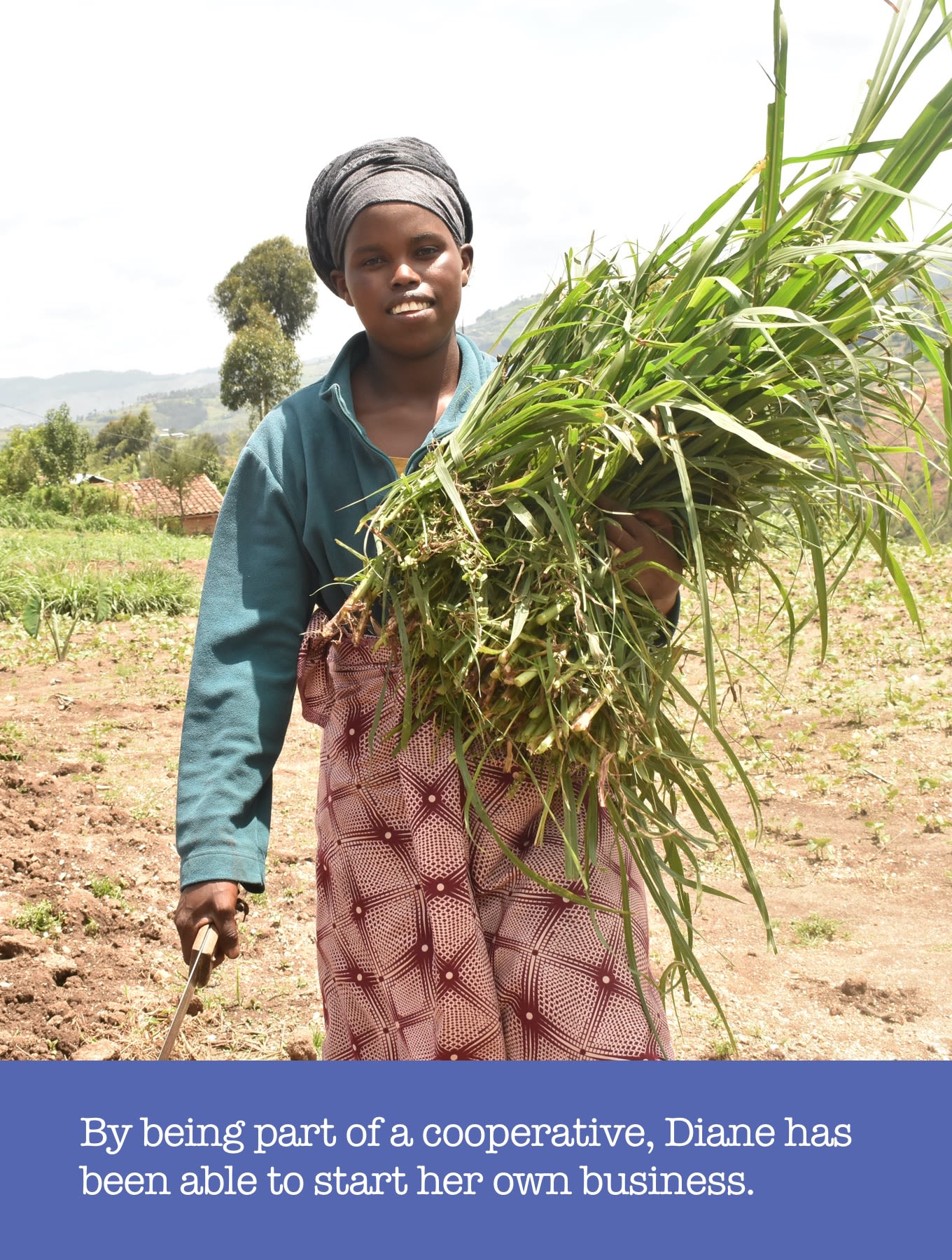
In Rwanda, 76% of the country's working population are engaged in farming. But women have less opportunity to earn a living than men. With the help of women cooperatives, this is changing.
"I mobilised women in my community to form a savings group that would help each of us start and grow a business. We began as 10 women and kept expanding until we became 30," explains Diane, who lives in Ruheru, south-east Rwanda.
Diane used to farm to feed her family; now she also earns a living selling meat.
"I had no plans to do anything else as I thought that was all I could afford," she says.
In 2018, ActionAid invited women in Ruheru to visit a local women’s cooperative. "I was impressed and surprised to see how it had changed their lives," says Diane.
ActionAid supported the women with the practical aspects of running a cooperative: training in how to record each member’s financial contribution and formalising the process for loaning money.
Each week, members of Diane’s cooperative contribute to a joint savings fund and in 2020, Diane was able to start her own business. "I had $40 and was able to borrow $30 from the cooperative," she explains.
Since then, Diane’s business has continued to grow: "I now sell goat meat as well as beef and I have been able to buy a machine that grinds cassava used to cook stew. The stew is popular in Rwanda and whoever buys it, buys the meat too."
The positive impact of the cooperative goes much further than improving the income of households.
"Women in our community no longer depend on their husbands for everything," says Diane. "Women can do lots of things to earn an income and I encourage others to join or form a cooperative. It is by working together that we, as women, gain confidence and support."

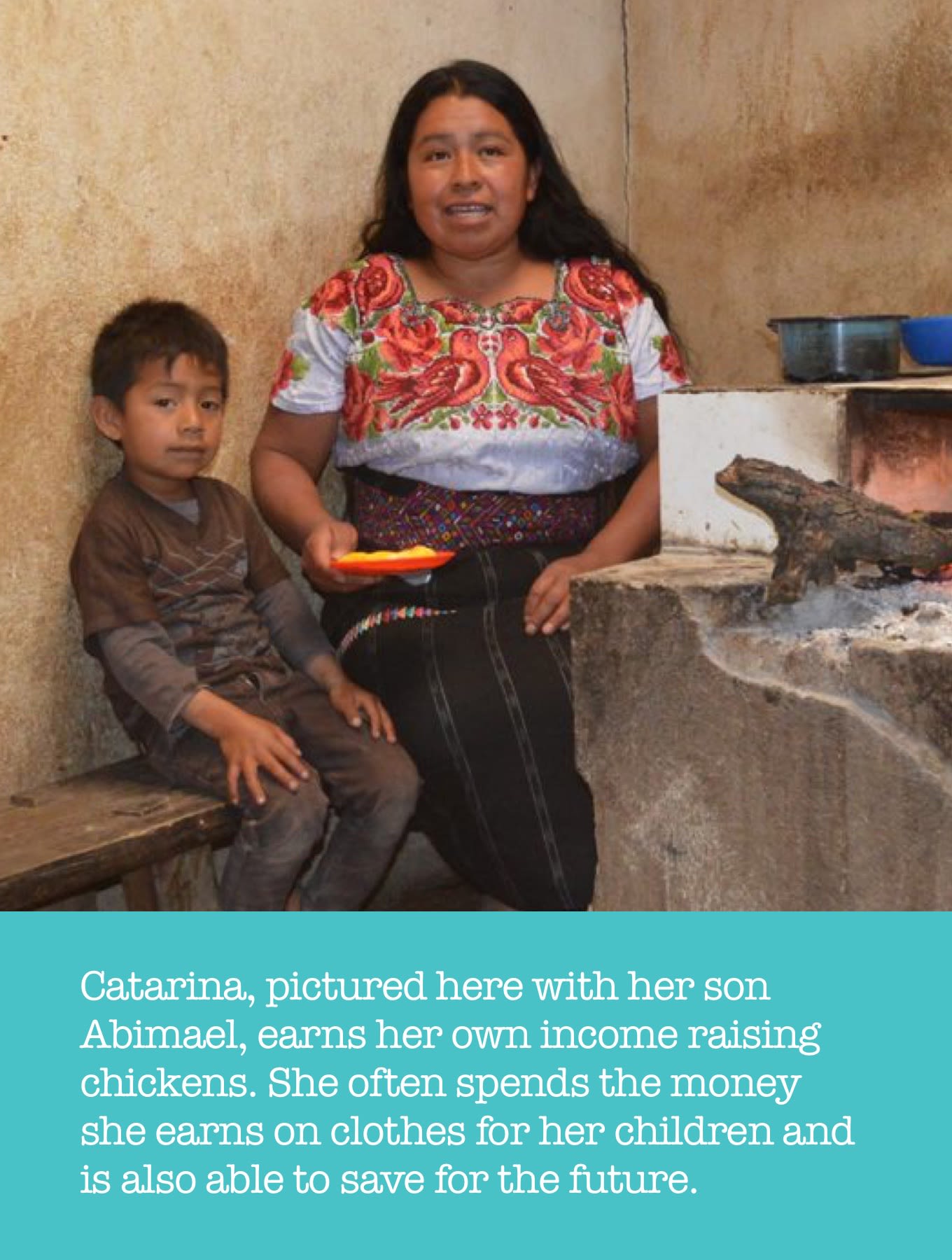
In Guatemala
Women are setting up businesses and becoming financially independent

Catarina is a successful, independent woman. She knows her rights and has no hesitation in claiming them.
But this has not always been the case. Like many women living in rural Guatemala, Catarina was once expected to stay at home and rely on her husband.
"My time was dedicated to raising our three sons. My husband was the only one to earn an income and I had no say in how that was spent," she says.
Things are different now. For the last seven years, Catarina has been a member of her community women’s group.
The group organises training in income generation and is helping more women to become financially independent. It also promotes awareness of women’s rights in the community.
"Myself and 13 other women learnt how to keep chickens: how to take care of their health, keep them safe and feed them," says Catarina.
After the training, I received a hen house and some chickens. My chickens lay at least 20 eggs each week. This means I can buy clothing for my children, and we have nutritious meals with the eggs I don’t sell.
"This is a small project but it’s a big change for us. I am grateful to have been shown that us women have the right to earn our own income."
In Cambodia
Women are learning new farming techniques to create better futures
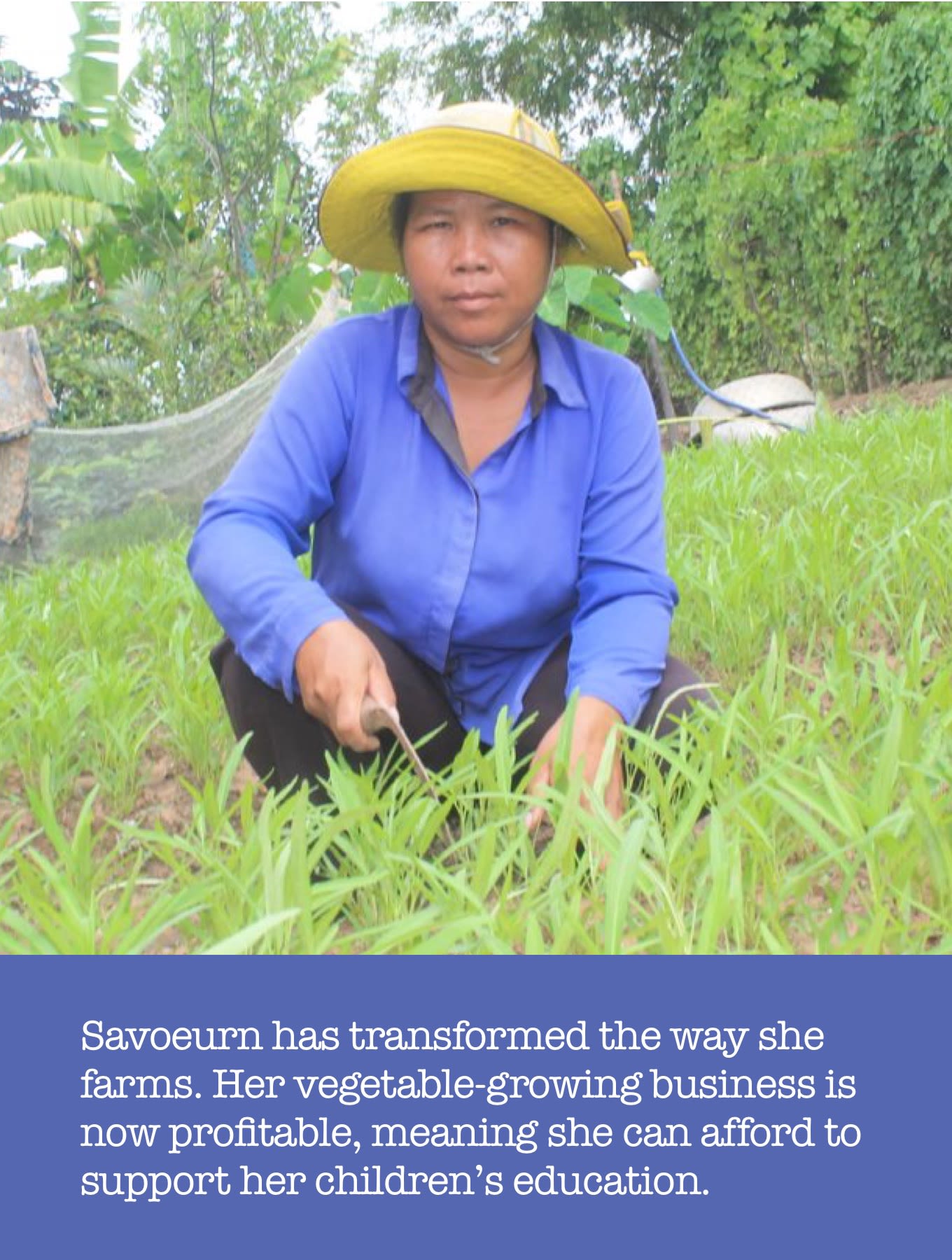
"My family used to earn very little. We were in debt because we couldn’t produce enough vegetables," says Savoeurn, from Cambodia.
Savoeurn has four children and lives in the Kampong Thom Province of Cambodia. Many families in her community face difficulties in earning a living from farming.
Today, however, life is very different for Savoeurn and her family. "I now earn around $25 per day selling my vegetables," she says. "Before, I could only earn around $9."
Savoeurn was among a group of women to take part in training in farming techniques and market entrepreneurship.
"I learnt about planting techniques, composting, producing natural pesticides and having an entrepreneurial mindset," she tells us.
After the training, I decided to cultivate some land behind my house so I could grow more vegetables. Now I grow almost 10 kinds, including cucumbers, gourds, spinach and beans.
"With what I have learnt, I can produce a higher yield than before, and types of vegetables that have a greater demand and price at market. I am now able to save money towards my children’s education so that they can have a better future."

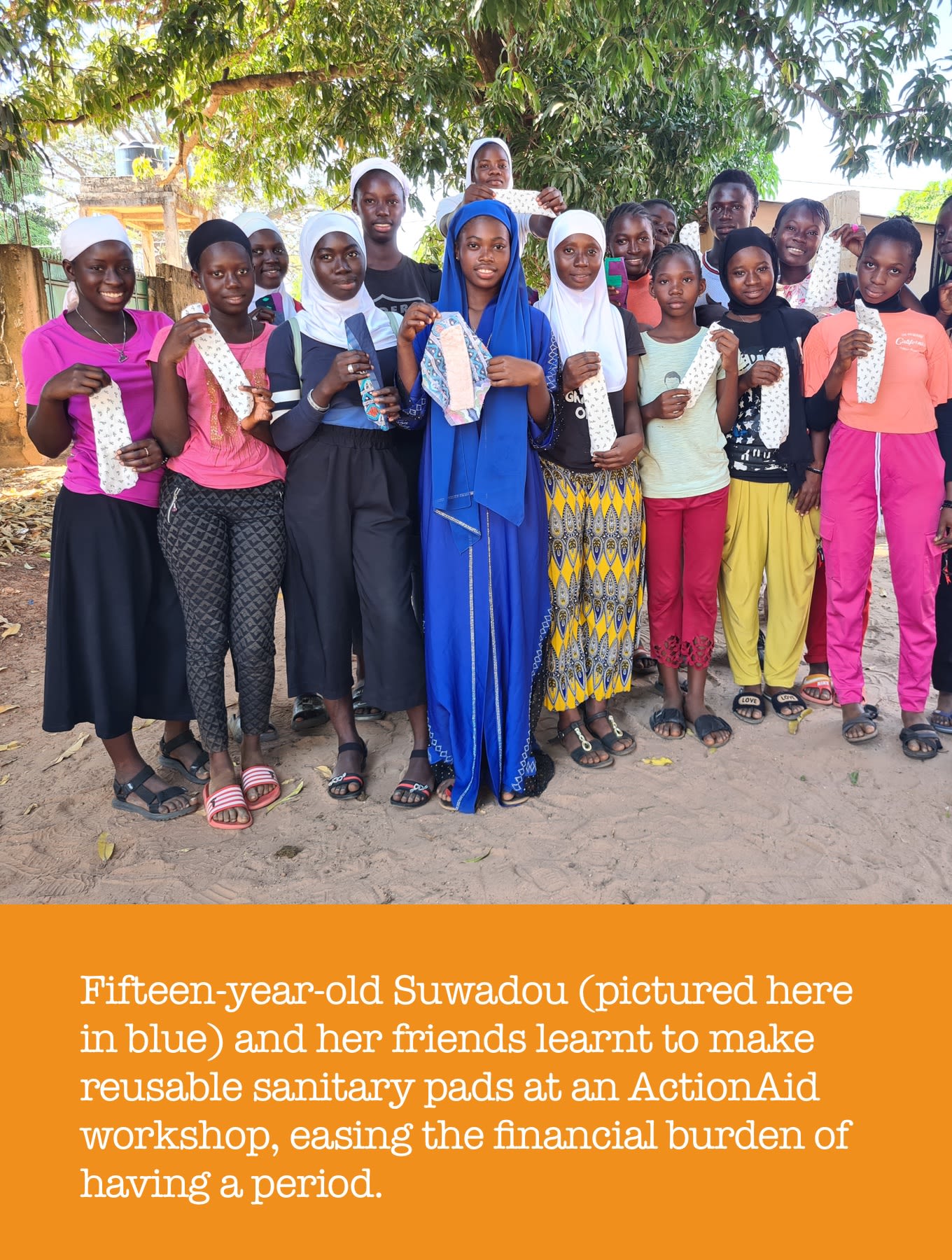
In The Gambia
Girls are making it their mission to end period poverty

Suwadou does not let her period get in the way of her education. Instead, she has made it her mission to end period poverty.
"When I had my first period, I thought I was dying," says 15-year-old Suwadou. "I didn’t know anything about it."
Her experience is not uncommon. For many teenagers in The Gambia, their period comes as a surprise. This can be distressing, because girls are often not equipped to manage their period safely or with dignity.
"I used to avoid going to school during my period, and it was the same for many girls in my community," Suwadou tells us.
The need to increase awareness among girls about sexual and reproductive health was first raised during a community meeting in Upper Niumi, a rural district in The Gambia where Suwadou lives.
To support this community priority, ActionAid organised a training programme involving 50 teenage girls. Suwadou took part; she says:
ActionAid has provided me with knowledge and skills that will benefit me for the rest of my life."
The cost of period products is another challenge. "I felt that I was putting a financial burden on my step mum, so sometimes I would just go without a pad," says Suwadou.
To help with this, the girls on the training programme were also shown how to make reusable sanitary pads and given the materials to do so.
In Ghana
Boys are standing up for women's rights
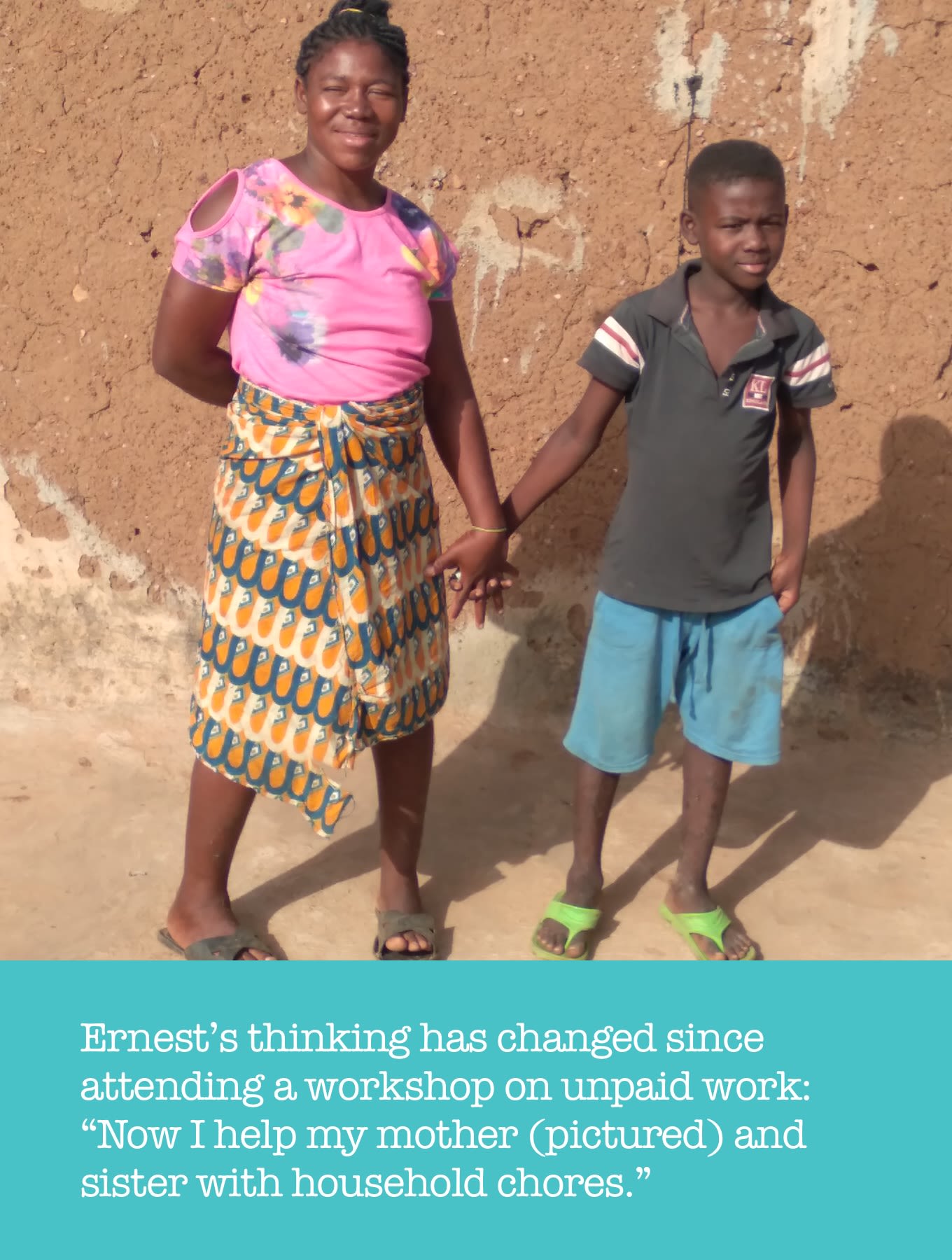
"I used to wake up, have my breakfast and go to school. After school, I would play football. I never did any chores because I thought they were for women and girls," says 14-year-old Ernest, from Ghana.
In Ghana, it's estimated that women and girls dedicate between three and six hours each day to household chores.
This unpaid and often unacknowledged work can involve anything from cleaning, washing and cooking to collecting water and childcare.
Each task is time-consuming and often physical, leaving little time or energy for anything else. This has a big impact on women: undermining their economic rights and limiting opportunities, including access to education, employment and leadership positions.
But this is changing and boys like Ernest have a role to play, as he explains:
ActionAid held a workshop at my school on unpaid work. I learned that by helping with the chores, my sister can concentrate on her studies and my mother will have time to earn her own income.
"I encourage my friends to help their mothers and sisters because my mother now has time to do business and help us with our education, and my sister no longer goes to school tired. Her grades have improved too.
"The training changed my life. Me and my friends now know about the benefits of boys doing what we previously thought was for only girls."

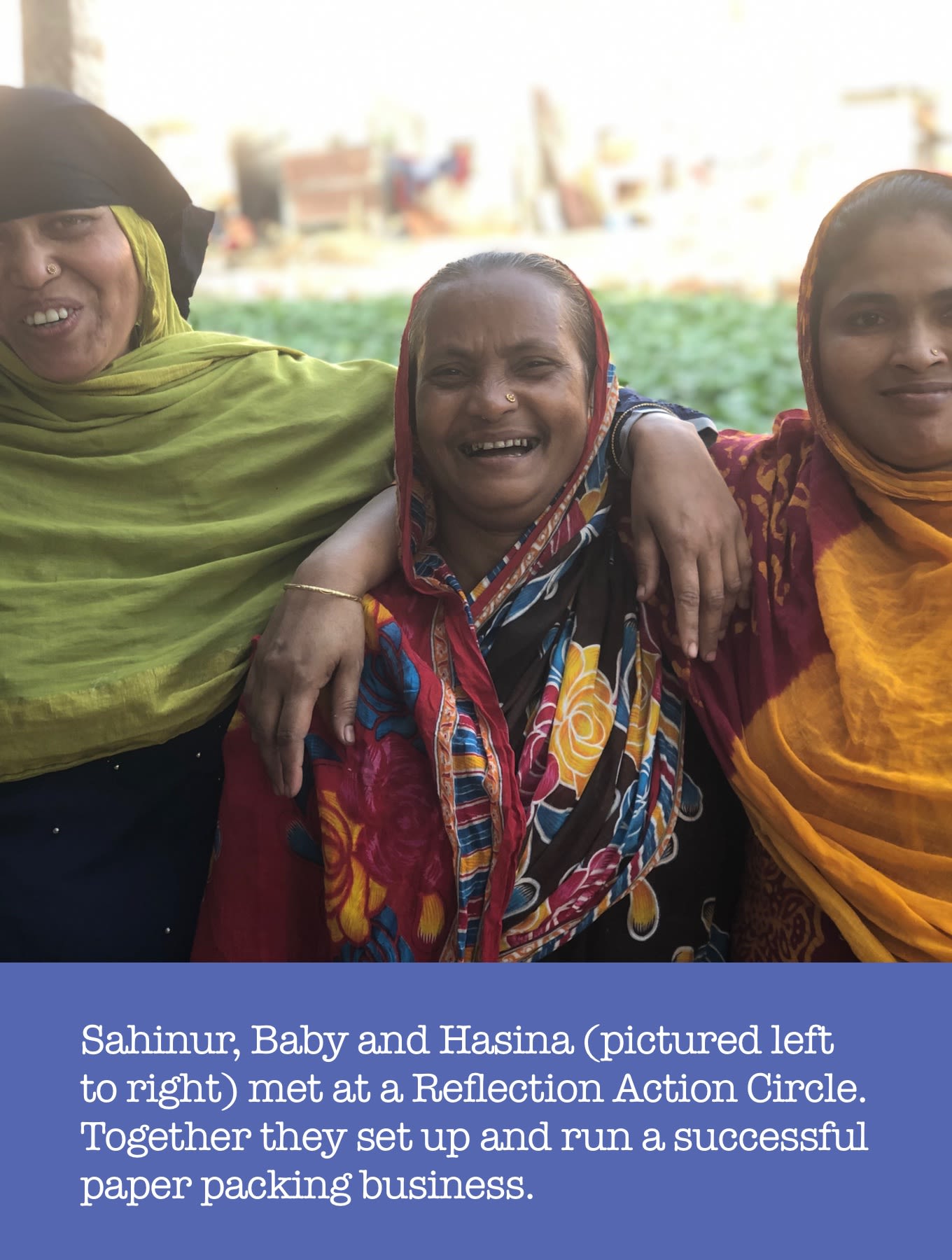
In Bangladesh
Women are transforming their lives by setting up successful businesses

"If we women have confidence in ourselves, we can overcome any situation," says Hasina, a businesswoman and mother of three from Bangladesh.
But Hasina has not always felt this way. "We were not aware of our rights," she says. "As women, we didn’t believe in ourselves, our strength or our power."
In recent years Hasina started attending a Reflection Action Circle - a discussion and awareness-raising group for women.
At these Circles women support other women by sharing information, discussing problems and together finding solutions.
Workshops also provide space for women to discuss their rights and develop confidence and self-awareness to defend them.
"Since losing my job during the coronavirus pandemic, I worried that I could no longer afford my daughter’s schooling," Hasina says.
"I joined the Reflection Action Circle and following a business skills workshop, myself and two other women started a paper packing business.
The business is doing well and I can now afford my daughter’s education and also contribute towards family expenses.
"With the support of women in the Reflection Action Circle, together we can overcome any situation.
"Even though it is us women who usually face obstacles in society, if we work together, we can get through these struggles and improve our situation."
Donate to support more people to lead change
If you've been inspired by these stories, please make a donation to stand with more women and girls who are leading change around the world. We're grateful for your support.
Images: Jean de la Croix Havugimana/ActionAid; Nancy Vásquez/ActionAid; Lang Lach and Tha Sen/ActionAid; Saikou F Bah/ActionAid; Nancy Amiziah Awinbisa/ActionAid; Bishu Chakraborty/ActionAid

